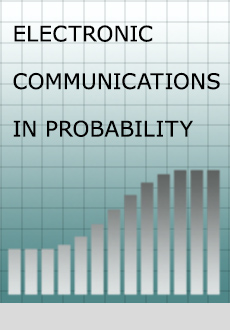Abstract
Let $\big(M_k, Q_k\big)_{k\in\mathbb{N}}$ be independent copies of an $\mathbb{R}^2$-valued random vector. It is known that if $Y_n:=Q_1+M_1Q_2+\ldots+M_1\cdot\ldots\cdot M_{n-1}Q_n$ converges a.s. to a random variable $Y$, then the law of $Y$ satisfies the stochastic fixed-point equation $Y \overset{d}{=} Q_1+M_1Y$, where $(Q_1, M_1)$ is independent of $Y$. In the present paper we consider the situation when $|Y_n|$ diverges to $\infty$ in probability because $|Q_1|$ takes large values with high probability, whereas the multiplicative random walk with steps $M_k$'s tends to zero a.s. Under a regular variation assumption we show that $\log |Y_n|$, properly scaled and normalized, converge weakly in the Skorokhod space equipped with the $J_1$-topology to an extremal process. A similar result also holds for the corresponding Markov chains. Proofs rely upon a deterministic result which establishes the $J_1$-convergence of certain sums to a maximal function and subsequent use of the Skorokhod representation theorem.
Citation
Dariusz Buraczewski. Alexander Iksanov. "Functional limit theorems for divergent perpetuities in the contractive case." Electron. Commun. Probab. 20 1 - 14, 2015. https://doi.org/10.1214/ECP.v20-3915
Information





